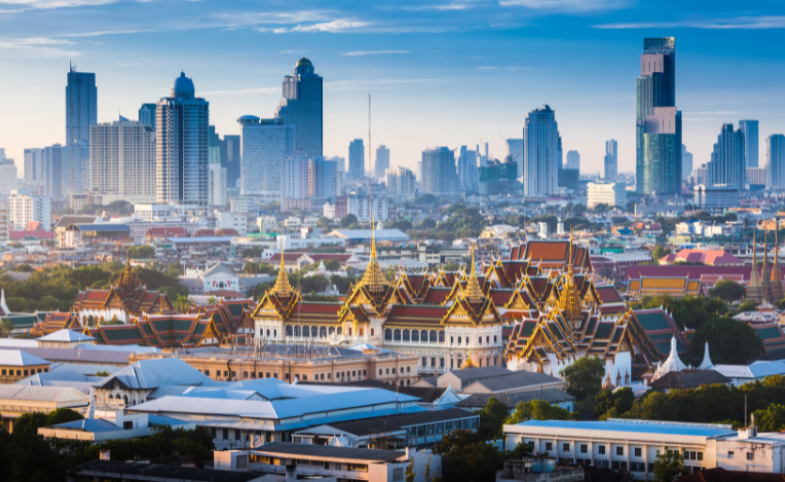In a recent interview published by India’s public service broadcaster DD News, Sanskrit scholar Professor Chirapat Prapandvidya, from Thailand, exclaimed, “Thailand is the most crucial place for study of Sanskrit. We started...
KEEP READINGThe CPD Blog is intended to stimulate dialog among scholars and practitioners from around the world in the public diplomacy sphere. The opinions represented here are the authors' own and do not necessarily reflect CPD's views. For blogger guidelines, click here.

Thai Cultural Diplomacy: Moving Beyond Traditional Culture?
The practice of cultural diplomacy in Thailand preceded the use of the term “public diplomacy,” which wasn’t employed until the 2010s when a department in the Ministry of Foreign Affairs (MFA) adopted the name. It is therefore useful to analyze the characteristics of Thai cultural diplomacy.
Cultural diplomacy, simply put, is the promotion and exchange of national cultures abroad. Cultural exchange and foreign policy have been intertwined throughout history with “people [using] culture to display themselves, to assert their power, and to understand others.” Culture is a handy asset for promoting national images and developing a deeper understanding with foreign publics, particularly in the early stages of public diplomacy. This has proven true not only for Thailand but for other ASEAN countries, such as Cambodia and Laos.
The Origin of Thai Cultural Diplomacy
During the 1960s and 1970s, Thailand had been internationally known through the Vietnam War for its U.S. troop bases. The nation was stricken by communist insurgency, political instability and poverty. The country’s reputation was tarnished by the image of prostitutes and a transit point for narcotic drugs. The Thai government realized the need to improve its image through informative communication with the foreign public by promoting its cultural heritage and natural heritage.
MFA thus began its cultural diplomacy, albeit with a limited budget, by introducing traditional culture like classical dance, Khon mask play, Thai kickboxing (Muay Thai) and food overseas. Meanwhile, the Thai Tourism Authority (TAT) was founded in 1960 to promote tourist attraction. As such, Thai public diplomacy arguably started with the function of public relations, aiming to improve the nation’s image and gain income from tourism. By the 1960s, Thailand came to be internationally known for its food, kickboxing, massage and tourism, partly owing to the American GI presence. Even though the aforementioned Thai cultural elements are similar to those of neighboring countries such as Cambodia and Laos, Thailand was able to reap the first-mover benefit due to its earlier promotional efforts.
Culture in a Broad Sense
Thailand tends to view other elements broadly as a part of its culture. For example, rather than being classified as sports diplomacy, Thai kickboxing (Muay Thai) has been regarded as cultural diplomacy. This is because Muay Thai had largely been treated more so as performance than competition until the 2010s, when “Thai Fight” kickboxing matches came to be promoted internationally. Food has always been publicized together with cultural performances, usually in the form of cooking demonstrations, thus being viewed as a part of culture as well. The term culinary diplomacy or food diplomacy came to be used only in the 2000s. Overall, the aims of cultural diplomacy are not only to promote Thai culture abroad but also to attract tourism to the kingdom.
Cultural diplomacy generally aims to promote tourism and food exports. With its bureaucracy slow to change, Thai cultural diplomacy tends to be conservative.
Culture, food and tourism have become the three key assets to be promoted together under Thai cultural diplomacy. Since the 2000s, the MFA has had a greater budget for promoting cultural diplomacy initiatives, such as “Thai Kitchen to the World.” Examples include Thai Food Festivals, coupled with cultural shows, which have annually been held in many major cities around the world. Observably, Thai cultural diplomacy tends to be one-way, even though foreign participants are invited to take part in Thai cultural shows. Mutual cultural exchanges have been rare.
Conservative Cultural Diplomacy
In terms of actors, there are four major government agencies involved in cultural diplomacy, namely the MFA, the Ministry of Culture, the Ministry of Tourism and Sports (with a leading role of the Tourism Authority of Thailand) and the Ministry of Commerce, which is in charge of food exports and the promotion of Thai restaurants overseas. The Ministry of Culture, which dispatches cultural performers, prioritizes the preservation of traditional culture, although it also oversees pop culture as well. Traditional culture is also considered high-class and appropriate for formal occasions and to show to foreigners. Trapped in past practices, traditional culture tends to come to the minds of most practitioners when planning cultural diplomacy. The situation is understandable in the past when Thai pop culture was underdeveloped. Fortunately, as Thai movies, series and singers are gaining international popularity, pop culture is increasingly incorporated into cultural events overseas. Yet, more can be done, including a higher proportion of pop culture and the use of pop idols, celebrities and famous sports players as cultural ambassadors.
Conclusion
Traditional culture has been central to Thai cultural diplomacy, which has tended to be one-way and has utilized event-based performances, particularly classical dance and Khon mask play. Culture is defined broadly, including food and traditional sports like Muay Thai. Cultural diplomacy generally aims to promote tourism and food exports. With its bureaucracy slow to change, Thai cultural diplomacy tends to be conservative. Thailand would benefit from an upgrade to more innovative cultural diplomacy initiatives, whereby pop culture and private cultural icons are activated. Mutual cultural exchanges are also important for intercultural understanding and sustainable relationship building.
Visit CPD's Online Library
Explore CPD's vast online database featuring the latest books, articles, speeches and information on international organizations dedicated to public diplomacy.
POPULAR ARTICLES
-
January 29
-
January 20
-
January 28
-
February 6
-
January 8
Join the Conversation
Interested in contributing to the CPD Blog? We welcome your posts. Read our guidelines and find out how you can submit blogs and photo essays >.













